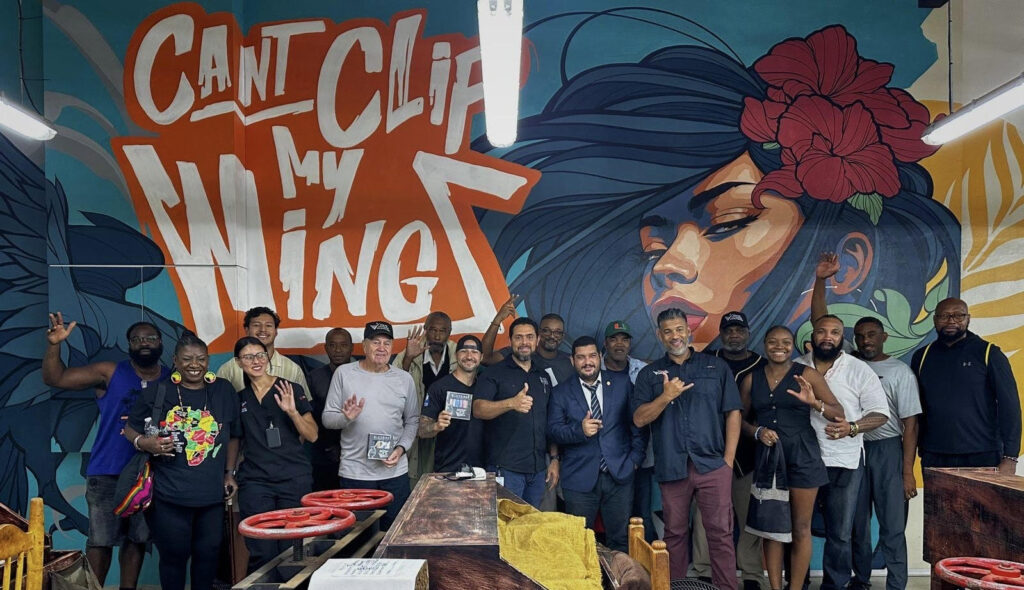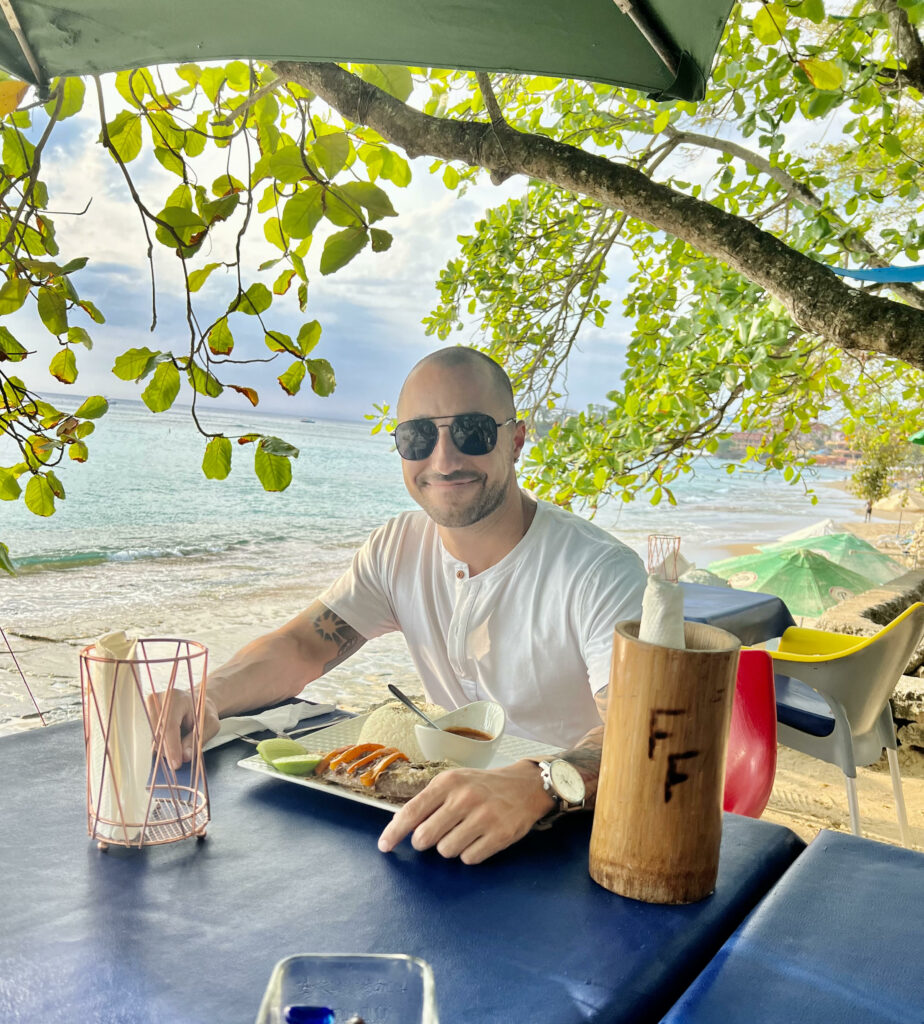A Vietnam Veteran sits in the lobby of MedVets in Puerto Plata sipping coffee waiting for group therapy to start. Wyatt Gresham was an eighteen year old kid drafted to Vietnam who “never felt at home in America again after how we were treated.” Now Wyatt lives in the Dominican Republic, enjoying ocean views and peace in his retirement. Wyatt alongside twenty thousand other American veterans have found discovered a higher quality life post service in the beautiful Dominican Republic.
There are clinics all over the Dominican Republic, from Punta Cana to Puerto Plata that operate through the Foreign Medical Program for service-connected veterans, taking care of American vets. I’m writing this to let my fellow Veterans know that sometimes we can live healthier, happier, and more peaceful lives here on this beautiful island.

Veterans are finding happiness and a fresh start after relocating here. There’s a higher quality of life at a lower cost, not to mention the beautiful nature and island lifestyle. Veterans are living their best lives in the Dominican Republic and there are Medical Centers specifically for service connected veterans that operate throughout the country.
“I feel at home at home and healed as a Veteran living in the Dominican Republic.“
Retired SFC Keith Pyron speaking about the holistic care at USADR Veterans Clinic in Puerto Plata. Check out his YouTube Channel for Living in DR info and content.
What’s Provided For Service-Connected Vets in DR?
- Primary Care
- Physical Therapy
- Aquatic Therapy
- Massage
- Mental Health
- Pharmacy 24/7
- Traumatic Brain Injury Care
- Telehealth
- Acupuncture
- Group Therapy
- Chiropractor
Note: In order to be seen in these clinics you must have a service connection from the VA. That includes disabilities rated at 0%. However, these clinics don’t turn veterans away and will work with you to get you your rating and provide a lot of great events and are more geared towards holistic medicine than the VA.
Why the Dominican Republic?
The reasons veterans are choosing to leave the United States aren’t hard to uncover. The high cost of living, political division, mass-shootings, and stressful culture. The reasons veterans are coming to the Dominican Republic are inspiring: the low cost of living and gorgeous beaches are on the list but the best thing about the Dominican Republic is the people. Family, God, and community are very present here.
“The US got way too crazy. After years of military life, I just wanted peace. When I got here, everything clicked at I’m eating better, feeling happier, and it’s nice to just be able to finally relax.”
Air Force Vet Anthony aka DJ Bad Habits, an Air Force veteran who moved to the Dominican Republic during covid.
DR Clinic Links
Puerto Plata/Santiago/Sosua: Juvante
Puerto Plata: USA DR – Listen to Air Force Vet Mike talk about his healthcare experiences and life here. Check them out on YouTube as well.
John’s Note: I do not recommend any one healthcare center more than another. You can visit these centers even if you are on vacation or visiting temporarily, which I recommend you do. They will be happy to provide you a tour and most provide services beyond healthcare, including help with things like relocation.
If you’re debating moving abroad, read my article 5 Tips For Veterans Moving Abroad to get started. It’s never been my mission to convince Veterans to move abroad, I’d just like to provide information and resources for those interested in doing so. I’m still my brothers and sisters keeper and believe we must be there for one another, even more so after service.
Questions Answered
How much money do I need to live in the Dominican Republic?
You can live well on a military retirement or if you’re rated 100% from the VA. My rent is $500 a month for a one bedroom, with another $160 for internet and electricity. You can live a high quality life as a veteran with your benefits. Budget is one thing that’s hard to specifically nail down because everyone has a different ideal quality of life. I have a friend who lives in the same town I do, and lives on half as much money. He doesn’t drink and all he really likes to do is work out and scuba dive. To explore more, check out my Veterans Moving Abroad: The Financial Aspects article.
Do I need to speak Spanish?
In the ex-pat areas like Punta Cana, Cabarete, or Sosua you can get by with little or no Spanish and be fine. Most Dominicans speak a little bit of English, more so in touristy areas. The best way to learn is to dive in and practice, I didn’t speak any Spanish when I first moved and now i get by pretty well. Dominicans are extremely friendly and willing to help or practice their own English. Duolingo is a solid resource you can start learning on your phone and switch over your Netflix to Spanish and you’ll figure it out well enough. Or just date a Dominican and you’ll get there sooner.
What are some of the drawbacks?
- Driving here is pretty wild.
- “Island Time” You have to be patient, nothing happens here on time.
- Electricity can be an issue unless you have a generator.
- General corruption. If you get pulled over, the cop might drop a hint you can go ahead and give him 1,000 Pesos (less than $20) to go about your day.
- Hurricanes. (Mainly on the south shore. There’s never been a recorded hurricane in my area)
What are the pros?
- DR is easier than about anywhere to relocate to. You can pretty much stay as long as you want and then pay an “exit fee.” Read about the DR exit fees and see rates here.
- Thriving Expat Community: Check out Expats Living in DR on Facebook. There are several groups you can look into. These are also good to apartment shop.
- Year round beautiful weather and picturesque beaches.
- Proximity to the U.S. There are consistent flights from Puerto Plata, Santiago, Santo Domingo, and Punta Cana to all over the states.
- Foreigners have full property rights, you can buy apartments, land, and houses.
- Great culture, restaurants, and nightlife. The whole country is a party.
Where Do I live?
I prefer the North Shore personally. Punta Cana is more touristy and I think there’s more going on up here. Santo Domingo has a lot of veterans, but also a lot of people. I generally think cities are unhealthy for veterans, too much pollution, crime, traffic, etc. I generally think it’s a good idea to live near a veteran center, because that means you also live near other veterans.
When it comes to finding a place, Facebook is your best starting point. You don’t want to stay in an Airbnb long term because it’ll get too expensive. In DR, like the rest of the world prices are going up and they’re going to continue to rise as more people discover how amazing this place is. The best way to find a place is to get on the ground and network and look.
Should you buy or rent?
It’s better to rent initially when moving abroad most of the time. I still rent and I’ve been here for years because it’s simpler. But you’ve got full property rights as a foreigner in the Dominican Republic. I would strongly recommend going through a trusted and Veteran friendly agent like my friend Ingrid out in Las Terrenas at Eliun Real Estate if you want to buy. There are lots of great international realtors on the island and lots of competition. Work with someone that feels good for you and make sure you meet with a few realtors before deciding on one.
Facebook Groups To Scope Out
- Expats Living in the Dominican Republic
- Everything Sosua Dominican Republic
- Cabarete/Sosua Real Estate for Sale and Rent
- Punta Cana Expats
- Veterans Living in Puerto Plata – Ran by a female Veteran.
Note: There are lots more groups to search and this is your best starting point. International realtors will overcharge you and Airbnb fees add up. You can find a 30 day spot, which everyone should do before moving here to see if it’s for you. Read about conducing your Moving Abroad Trial Run in my Veterans Guide To Moving Abroad. This is a must.

Is it safe?
In my time living here, I’ve never had a serious issue with safety. After living for years in Afghanistan though just about anywhere feels safe though. I think veterans are well-suited to be expats because we know how to take care of ourselves. You shouldn’t be flashing cash and dressing down is always a good idea. If you’re a vet you know to perform a little recon, avoid going certain places alone, and don’t get too drunk. Check out my itinerary of my town: Sosua: The 5 Day Itinerary.
Like most countries the violent crime is mainly contained to certain areas. The Politur is the Dominican Republic Tourist Police and have a strong presence in expat areas. They protect the tourists and foreigners because an enormous percentage of the countries economy is tourism. They work hard to keep the “gringos” safe.
As a female, similar to anywhere else you have to take some extra safety precautions. The best countries for female veterans in my personal opinion are Costa Rica and Thailand, although I know lots of female vets thriving in DR. Most female veterans I know tend to be in the Punta Cana area.
Check out my latest book 365 Days of Veteran Affirmations, and my other books listed on my website. On my Blog I get into writing about everything from Traveling With Veteran PTSD, to Nature Therapy, to even Dating Abroad. Please check it out and share the articles and resources with other veterans. If you’re a Veteran interested in moving abroad and still have questions, you can hit me up on Instagram and TikTok where I post some of my living abroad adventures and veteran content.
John’s Note: My mission is to provide positive information for veterans about living abroad, resources and information. There are no affiliate links in any of my living abroad articles or my social media content. I believe sometimes veterans can be healthier and happier outside of the United States. There’s no running away or escaping your problems. But often times, you can heal, grow, and find peace abroad in ways you can’t in the USA. If you’re struggling with your mental health, I’m here for you if you want to talk and will respond on IG or email. You can also contact a veteran organization or chat with the Veterans Crisis Line.
